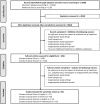Systematic review on irrational use of medicines in China and Vietnam
- PMID: 25793497
- PMCID: PMC4368648
- DOI: 10.1371/journal.pone.0117710
Systematic review on irrational use of medicines in China and Vietnam
Abstract
Background: Irrational use of medicines has been an issue concerned all over the world and the outlooks in developing countries are more severe. This study aimed to assess the different patterns of irrational use of medicines and its influential factors in China and Vietnam.
Methods: A systematic review was performed on both published and grey literatures in English, Chinese and Vietnamese languages between 1993 and 2013 based on the WHO framework. Quality assessment was conducted on the basis of the Critical Appraisal Skills Programme. Key indicators were analyzed to compare the irrational use of medicines in two countries.
Results: A total of 67 published works about China and 29 about Vietnam were included, the majority of which were cross-sectional prescription studies in both China and Vietnam. Irrational use of medicines was found in both the countries but issues with polypharmacy as well as overuse of antibiotics were more severe in Vietnam while overuse of injections was unique to China. Various patterns of irrational use were also indicated between urban and rural areas, and among different levels of hospitals. Rarely does literature focus on the analysis of influential factors of irrational use of medicines. While lack of proper knowledge from both providers and patients were the most recognized influential factors in both countries, economic incentives from pharmaceutical companies in China, and weak control and regulation over prescriptions in Vietnam were the main factors attributed to this issue.
Conclusion: Severe irrational use of medicines has been abundantly evidenced in both China and Vietnam, highlighting the importance of policy interventions on the issue. However, limited evidence on the appropriateness or its compliance (conformity) to guidelines of prescription has been found. In addition, convincing evidence on the underlying explanation of this issue is lacking, although economic incentives, health insurance coverage, and knowledge of service providers and users have been implied to be factors influencing irrational drug use.
Conflict of interest statement
Figures
References
-
- White TJ, Araekelian A, Rho JP (1999) Counting the costs of drug related adverse events. Pharmacoeconomics, 15(5):445–458. - PubMed
-
- Lazarou J, Pomeranz BH, Corey PN (1998) Incidence of adverse drug reactions in hospitalized patients: A meta-analysis of prospective studies. Journal of the American Medical Association 279(15):120–125. - PubMed
Publication types
MeSH terms
Substances
LinkOut - more resources
Full Text Sources
Other Literature Sources
Medical



